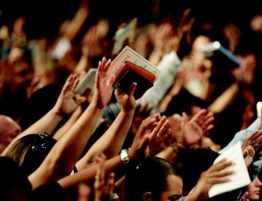
The Bible says that there will be false prophets in the last days. Coincidentally(?), many preachers today call themselves prophets. Considering the influence these people have on Christians, it is imperative that we learn how to identify false prophets. That’s what this article teaches you.
Main Points
-
- One strike and you’re out. If a prophet makes one wrong prediction, lights out.
- Even if their predictions come to pass … if their doctrine is false, they are false.
- False prophets are known by the fruits.
- True prophecies are consistent with the rest of God’s revelation.
DOWNLOAD FREE CHAPTERS FROM OUR NEW BOOKS
Scriptures
Matthew 7:15 Beware of false prophets, which come to you in sheep’s clothing, but inwardly they are ravening wolves.
Matt 24:11 And many false prophets shall rise, and shall deceive many.
Matt 24:24 For there shall arise false Christs, and false prophets, and shall shew great signs and wonders; insomuch that, if it were possible, they shall deceive the very elect.
2 Peter 2:1 But there were false prophets also among the people, even as there shall be false teachers among you, who privily shall bring in damnable heresies, even denying the Lord that bought them, and bring upon themselves swift destruction.
1 John 4:1 Beloved, believe not every spirit, but try the spirits whether they are of God: because many false prophets are gone out into the world.
Categories of false prophets
False prophets fall into two categories:
1) those outside the church, who are really no grave danger to believers; and
2) those inside the church, wolves in sheep’s clothing.
Paul told the Ephesian elders that men would rise up from their own midst and draw men away with false doctrines (Acts 20:29,30). These are the ones the church must beware of and be able to identify before they wreak unprecedented havoc. The Bible does give us guidelines for recognizing false prophets, apostles and teachers.
Why are there so many false prophets?
The major reason why there are so many false prophets in the church today (especially the charismatic church) is because we have lost the ability to exercise discernment. The Bible is so clear on how to recognize false prophets, you have to be blind to miss it. It baffles me how so many prominent pastors allow their congregation to be hoodwinked by travelling conmen who call themselves prophets, but are nothing more than imposters looking for quick cash from gullible Christians.
Another reason is that Christians are so hungry for “revelations” outside of God’s word – “personal revelations”. The problem with these Christians is that they are more concerned with their own lives and affairs than the kingdom of God. These are the sheep who leave the protection of the fold, and make themselves open prey to ravenous wolves. The bible tells us to deny ourselves, take up our cross and follow Christ (Luke 9:23). If God’s will is not good enough for you, then you are exactly what wolves in sheep’s clothing are looking for.
Biblical Guidelines for recognizing false prophets
By Their Predictions
Deuteronomy 18:20-22
20 But the prophet, which shall presume to speak a word in my name, which I have not commanded him to speak, or that shall speak in the name of other gods, even that prophet shall die.
21 And if thou say in thine heart, How shall we know the word which the Lord hath not spoken?
22 When a prophet speaketh in the name of the Lord, if the thing follow not, nor come to pass, that is the thing which the Lord hath not spoken, but the prophet hath spoken it presumptuously: thou shalt not be afraid of him.
In Deut. 18:21,22 we are told that if a prophet’s prediction does not come to pass, that forever settles it. He is a false prophet and we are to never respect him as a true prophet. It does not matter how many of his predictions had previously come to pass, one strike and he’s out. The penalty for that was death (Deut 18:20) under the old covenant. A true prophet always hears infallibly from God. That is the standard the Old Testament set for those who would presume to speak in the name of the Lord. Perhaps God was trying to discourage false prophets. If we applied the same standards today, do you think so many people would dare to call themselves prophets?
So what about Jonah?
He predicted that Nineveh would fall in 40 days (Jon. 3:4), which of course did not happen. Although Nineveh did eventually fall, it did not happen within the time frame prescribed by Jonah.
Some prophesies are conditional and some are unconditional. Most of the Messianic prophesies were unconditional – did not depend on anyone other than God. Prophesies of judgment usually carried an implicit condition that if the people repented, judgment would be averted. This was precisely the case with Nineveh and Hezekiah (Isa. 38:1 cf. vs. 9). Isaiah initially prophesied that Hezekiah would not recover from his illness, but after the King repented, he God granted him recovery and 15 years extra life.
God usually gave a sign
Obviously the first criterion could not consistently be applied because the fulfillment of some prophesies was delayed for hundreds of years. People could not wait till then to determine whether the prophet was of God or not. God usually authenticated his true prophets at the onset of their ministry. After this they were qualified to bring further prophesies and the people recognized them as prophets.
In 1 Kings 13:3-5, the “man of God” gave a sign that he was truly sent by God. His prophesy later came to pass under the reign of Josiah (2 Kings 23:16). God also gave Hezekiah a sign that Isaiah’s word would come to pass (Isa. 38:8). Jeremiah was authenticated by God early on when he correctly predicted the imminent death of the false prophet Hananiah (Jer. 28:16). Because God validated his prophets, there was no doubt in the minds of any remotely devout person of their authenticity.
By Their Doctrine
Deuteronomy 13:1-5
1 If there arise among you a prophet, or a dreamer of dreams, and giveth thee a sign or a wonder,
2 And the sign or the wonder come to pass, whereof he spake unto thee, saying, Let us go after other gods, which thou hast not known, and let us serve them;
3 Thou shalt not hearken unto the words of that prophet, or that dreamer of dreams: for the Lord your God proveth you, to know whether ye love the Lord your God with all your heart and with all your soul.
5 And that prophet, or that dreamer of dreams, shall be put to death; because he hath spoken to turn you away from the Lord your God…
Here is where most modern prophets fall. There the possibility that even false prophets may make the occasional correct prophesy. Even so if he leads the people away from God, he would be considered a false prophet. This is interesting because people are always telling me how accurate such and such a prophet is – as if that means anything to me. God said that he tested his people in this manner. He tested whether their allegiance was to Biblical truth or spiritual sensationalism. Unfortunately many today would stumble at this very hurdle because they have no concern for doctrinal integrity or Biblical truth.
In the days of the apostles, there were some false prophets teaching that Jesus was not of God (1 John 4:1-6). In verse 6, John laid down the rule for identifying false spirits: whoever listens to us is of God. Of course any cult could quote that scripture. John was referring to the apostles’ teachings which was adhered to by the early church (Acts 2:14) – which for us was canonized in the New Testament. Anything that deviates from the teachings of the apostles / the New Testament is false doctrine.
Have you ever heard a prophet say that God’s truth is not limited to the Bible? Why do you think he needs to say that?
Consistency of Revelation
The true prophet’s message was a contrary one – one that robbed against the grain. The false prophet’s message found sympathy with the worldly elements within and without the church (1 John 4:5). In the OT, false prophets were people-friendly in their prophesying – they said what people wanted to hear (1 Kings 22:6-8; Jer. 5:31). The true prophet stood alone and was usually an outcast.
Jeremiah 28
1 Hananiah … spake … saying
2 Thus speaketh the Lord of hosts, the God of Israel, saying, I have broken the yoke of the king of Babylon.
3 Within two full years will I bring again into this place all the vessels of the Lord’s house, that Nebuchadnezzar king of Babylon took away from this place, and carried them to Babylon:
6 Even the prophet Jeremiah said, Amen: the Lord do so: the Lord perform thy words which thou hast prophesied,
7 Nevertheless hear thou now this word that I speak …
8 The prophets … of old prophesied both against many countries, and against great kingdoms, of war, and of evil, and of pestilence.
9 The prophet which prophesieth of peace, when the word of the prophet shall come to pass, then shall the prophet be known, that the Lord hath truly sent him.
Jeremiah 28 is very interesting. Read it for yourself. The prophet Hananiah predicted that God would free Israel from the hands of the Babylonians in 2 years. Jeremiah at first was very happy to hear that prophesy. He even shouted “Amen”. But he reminded Hananiah that since his prophecy of peace was contrary to what all the prophets of God had said before, they would have to wait to see if the prophesy was really true.
In other words consistency of revelation from God is a determining factor in judging prophesy. As it turned out, Hananiah was wrong and he died the very same year because of his false prophesy. If all the prophets predicted judgment, how could God for no apparent reason change His message to peace?
By Their Fruit
Matthew 7
15 Beware of false prophets, which come to you in sheep’s clothing, but inwardly they are ravening wolves.
16 Ye shall know them by their fruits.
In Matt. 7, Jesus taught that even if a prophet could do miracles, it meant nothing if his life did not bear the right fruit. Paul says the same thing in 2 Tim 3:1-5. In Acts 20:29,30 false prophets were the ones who drew disciples to themselves.
How the church today is inundated with such individuals! The prophets of old were not media celebrities who relentlessly pleaded with people for their financial offerings payable directly to their bank accounts. False prophets were the ones greedy for filthy lucre (1 Tim. 6:3-7). They may even fabricate lies and false testimonies just to hoodwink the gullible who cannot search truth for themselves (2 Pet. 2:3).
In 1 Cor. 11, Paul cites his sacrificial life as evidence of authentic apostleship. As you read it, you’ll realize that the sacrifice Paul talked about was not waking a few late nights or preaching 3 sermons a week. It is unlikely false prophets would sacrifice the very comfort of their lives because that would be counterproductive to their selfish goals.
Are there any true prophets today?
It is important to understand the true purpose of a prophet.
Ephesians 2:20 … built upon the foundation of the apostles and prophets, Jesus Christ himself being the chief corner stone;
This verse describes the church as a spiritual building, built on the foundation of the apostles and prophets, Christ being the chief cornerstone. Have you ever seen a building with the foundation on the roof? That’s a dumb question isn’t it? Then why are we looking for apostles and prophets AT ALL? They were (past tense) important to building the doctrinal foundation of the church. Now that we have the New Testament writings, you decide for yourself whether apostles and prophets are still needed in the church today.
This is just me, but I usually assume that every prophet is false unless they prove to me otherwise.






